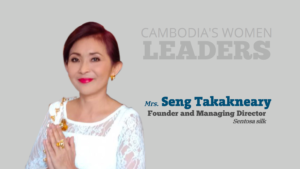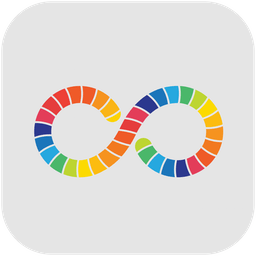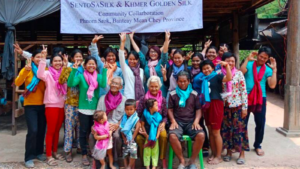
This is a single part of a series of stories of 21 women leaders of Cambodia. Download the full publication here.
Give a short introduction about your life (family, education, marital status) and how has your experience been as a leader and what achievements are you most proud of?
I am married with three children. My supportive husband is the one who inspired me to run my own business. My eldest is a fine young lady, a graduate of fashion design who is focusing on her own fabric collection line. I also have two sons, one who is now working as a manager, while my youngest is a university student. My mother lives with us and has helped raise my children while my husband and I have been working on our businesses. Overall, I am a happily married and contented family person, working on how to become a better person to help others.
I am a college graduate in Business Administration, and my first job involved working for a Japanese company. This experience gave me a lot discipline and motivation. But I have always had an entrepreneurial spirit, so when I saw some nice silk at an airport duty free shop during my travels, this gave me an idea. I said to myself: our country is very strong in silk, so why I don’t help revive the silk industry?
I started to follow my passion and love for our culture, by creating SentoSaSilk in 2004. We started operations in a small flat located in the busy streets along Phnom Penh’s riverside. From the beginning, I was committed to giving opportunities to disabled local people and to help improve their well-being by providing them with a job. SentoSaSilk started with two employees with physical disabilities, sourced from a Cambodian national organization for disabled persons (NCDP). Since then, the two have become trainers and teachers at SentoSaSilk, and have their own tailoring business and services. We also became the first team to be assisted by IFC/ World Bank under their project called “CraftNetwork”, which gave us access to the international market. As the company grew, more disabled people were given the chance to get decent jobs. On top of that, young aspiring graduates from poor families were given opportunities to get trained by SentoSaSilk, so more young citizens were able to acquire professional management experience. Moreover, craftswomen and weavers in different provinces were developed as entrepreneurs, providing sustainable income to their communities.
We aim to make an impact in Cambodian society by promoting Cambodian silk and culture, as well as providing opportunities to women and to less fortunate people by improving their living conditions and bringing thousands of families out of poverty. Producing high-quality silk products and uniform services is a platform for fulfilling our dreams. I am very passionate about developing Cambodian people’s skills and working on a sustainable path to expand and provide work for them.
Due to perseverance and passion to promote our country’s elegant products, we have acquired a lot of awards locally, regionally and internationally. I am very proud that we are the first company to have our Ikat collections registered in the Ministry of Handicraft for “Intellectual Property”. SentoSasilk is the first woman-owned business in Cambodia to become a member of the International Silk Union (ISU).
One of my most unforgettable moments was when I was selected to represent my country in the WTO Public Forum in Geneva. Likewise, I have represented Cambodia and women entrepreneurs of Cambodia on different ASEAN panel discussions. I was one of the 14 co-Founders of the Cambodia Women Entrepreneurs Association (CWEA), and the first elected president of the Women’s Business Association, and Association of Artisans of Cambodia (AAC).
The most fundamental lesson about leadership is to be humble and to be receptive to feedback.
When you first started out with your career, what were your most significant challenges?
My first challenge was when we got our first bulk order from World of Goods. In 2005, we weren’t used to receiving many orders and we didn’t have the technical knowledge yet, so getting a bulk order seemed like an impossible challenge But thanks to the World Bank’s support, we became one of the first 5 companies included in the pilot run of “Exporting goods to USA”, called CraftNetwork. This program was our gateway to new markets, and helped us refine the quality of our fabrics.
Since it was my first time running a business, I also found it difficult to train the staff as I myself did not have any spare time. I was constantly occupied with different inquiries and production issues, and didn’t know where to start in terms of building up the staff’s technical knowledge. At the time, we didn’t have people with the right management skills that could help me structure our operations, and we also had to deal with a lack of staff discipline.
Over the years, what valuable lessons have you learned as a leader?
I believe in “no pain, no gain”. You have to use critical thinking before deciding. Leading means giving and not taking. The most fundamental lesson about leadership is to be humble and to get feedback so you can be better. With humility, you can help other people sincerely and be honest with them. It’s also important to make your people part of the decision-making process. My clients, friends and staff are all my business partners. We should be building a long table where everyone can sit and eat, and not a tall fence that keeps people out. Building fences between yourself and the people who need you will separate you from reality, and you will be alone on the pedestal created by your own illusions. Transparency and diplomacy will set you free. Always seek the opinions of other people and do not take credit if you are not the one who made it. Always acknowledge the people who helped you succeed.
What are your core values and how do you ensure your team is aligned with your values?
For us, quality is imperative to not just attract new customers but also to retain our good reputation in the market. We believe that all successful businesses are built through the cultivation of long-term relationships based on mutual trust, professionalism and understanding. We also believe in creating job opportunities for underprivileged women, teaching them how to weave or tailor garments while providing a good work environment.
Our Core Values are:
- Integrity
- Growth & Innovation
- Compassion & Teamwork
- Respect for People, Culture and Environment
- Adherence to the 10 Principles of Fair Trade
What are some of the behaviors or traits that you think are negatively impacting leadership?
I think leaders should be visionary. See the bigger picture of where you want to go. Trust people and delegate jobs as necessary. If you make yourself too busy, you will lose sight of your vision. It’s also a bad idea to compare your own leadership style with others. Everyone is unique and everyone is trying to learn for the better. Leaders should always maintain a professional attitude, focusing on business goals and avoiding personal gossip.
Don’t stop learning. Every day is a new day and you will always have a lesson to learn. Don’t be too proud of yourself. Always put your feet on the ground and learn humility. You should know how to listen and to not talk too much yourself. We must have the ability to see things from other people’s perspectives.
Do not repeat the same mistake twice. A good leader learns from every mistake and experience. Acquire expertise by getting exposure to solving daily operational issues and making decisions. Indecisiveness will delay the task and will cause you to lose opportunities.
What are you doing to continue to excel as a leader (leadership tips in doing business and promoting women’s economic empowerment or gender equality)?
I used to run CWEA and was the first president of the Association. I fought for the association to stay firm, in spite of turmoil, wrong stories and lies. There were hard tears and hardship but I never thought of giving up, as I had my vision of this association being a good channel in developing good women leaders in the family. Now my vision to stay and continue until my term without giving up gave a very nice continuity and channel for new leaders to get trained, developed and be given the opportunity to exercise their leadership and get experience with proper guidance and correct mental behavior and attitude. I believe CWEA through the continuity of new leaders and active committee leaders became the number one and most active businesswomen association in the country and highly recognized by different ministries.
Leadership does not stop and has no term. One has to move on and continue to take leadership on other fields and not stop leading, and must always be aware. Now, I am a mentor to the next generation, especially the women’s youth. I support those women who are working while studying and looking for an opportunity to get a job to pay for their own tuition fees. I give opportunities to young people and put them into training to gain proper experience. We need to continue supporting and educating women in different levels who are interested in entrepreneurship to create more job and income generating opportunities for women.
On the other hand, as a business leader, we are expanding our silk operation to Seri Culture and weaving center on top of working with our existing weavers in different villages. We are nurturing our community workplace. Likewise, I will keep on helping my station to fulfil their dreams while they are with me, and create more opportunities for them to learn and get the experience they need. I will keep on evaluating information with a critical eye and judgement. I will try to always embrace the truth to lead and be trusted by my family, friends and colleagues. And most of all will find time to read books and join workshops to enhance myself and be corrected, professionally, personally and spiritually.
What are some of the biggest risks you’ve taken in your career and how did they turn out?
There was a time I invested in an imported fashion boutique shop and landed up with a wrong business. I used to have an imported fashion shop selling imported dresses and shoes, but I ended up with big inventory and non-moving stocks. The shop was built with very expensive building renovations and a high-end showroom, but it was not enough to call the attention of the people. Now the business is closed and it was a big lesson for me. There is also some price miscalculation that I sold the products negative GPM, so now we have developed proper costing sheets rather than using guesswork. Before, there was big staff turnovers but at the end, they returned to Sentosa Silk. So I ended up focusing on silk and expanding my business on its value chain to sustain my supply of raw materials and offer more affordable prices to my clients.
What makes Cambodian culture unique and how do you think Cambodia can thrive in this age of entrepreneurship & dynamic leadership.
We have unique cultural norms and backgrounds. Women are perceived to be elegant and beautiful with good shape. And that is also because, until now we are still carrying our traditional dress which is handwoven silk – the most elegant fabric in the world. Since there are so much good stories behind our fabrics, and it is getting popularity of its own, now China is seeing the potential and working to develop the Seri-culture of Cambodia to continuously develop the supply since the country is basically agricultural by nature.
Cambodia being strategically located beside Thailand and Vietnam and midway between China and India enjoys economic spillover from the growth of our neighboring countries’ economies. Cambodia has many natural resources and famous & popular tourism sites, mineral deposits, offshore oil and gas reserves and lots of fertile land for agriculture that are still untapped. Population: Approximately 15 million (2.2 million in Phnom Penh). We have strong GDP growth at average 6% per annum for the past decade, where the key industries are in tourism, textile & garment, natural gas, agriculture, construction, and timber, providing ease of access to maritime trade.
We have a young, inexpensive, willing and trainable workforce and rising productivity. We have stable politics, improved transport connectivity and rehabilitated railroads. We have lower costs of internet. Our demographics ensures rising domestic demand (61% of Cambodians are under 25 years old; median age: 21),
What advice do you have for young Cambodian female entrepreneurs?
“I believe from my own experience, leadership starts with a small group and that is your family. You cannot lead a bigger group if you fail to lead the small group closest to you.”
Challenge yourself. Take the risk. Focus and make your dream come true. Believe in yourself. Do the work that you care or are passionate about. Choose business that fits your skills and passions. Have a vision. Develop entrepreneurial spirit. Find good people. Develop good people. Join Business Associations that can help you grow and where you can find good mentors that will walk you through your way. Face your fears. Be brave and courageous to take a risk, and don’t be afraid to experiment. And most of all there is always room for improvement; be open to change – and find out how to have a good balance, life and spirit.
© Copyright 2019
This is a joint publication by Woomentum and Konrad Adenauer Stiftung. Download the full publication here.

